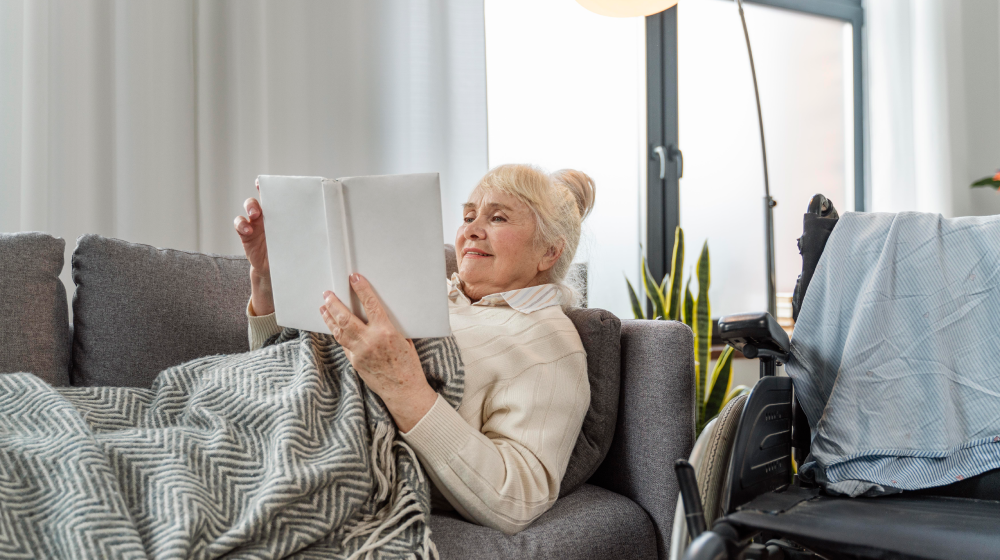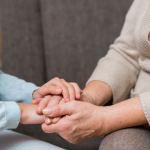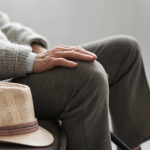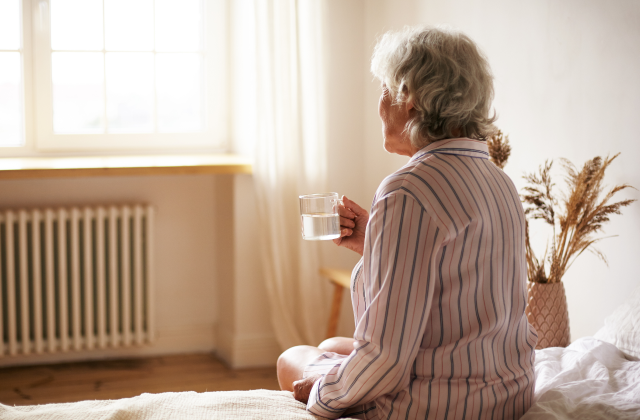Safe Movement Tips for Old People at Home: Let’s Help Them Move Safely and Comfortably in Their Daily Living
As we age, our ability to move safely in our homes is extremely important when it comes to our independence and quality of life. For a senior, safe movement in the home is not only a matter of physical action, but also making the home safer and easier to use (reducing the risk of accidents) to foster safe movement with confidence. For us at Angel Care HHA, we recognize the importance of practical home safety tips for seniors to consider and caring help in home movement for seniors, to protect against injury and aid in wellness.
Understanding Safe Movement in the Elderly
Aging often comes with changes in strength, balance, and coordination that can greatly impact the ability to move safely at home, with falls being one of the most impactful accidents. Falls are among the leading causes of injuries to seniors and can have serious ramifications, such as fractures and hospitalization, along with the loss of independence. Thus, the important strategies that focus on fall prevention in the elderly should be embraced.

Practical Home Safety Tips for the Elderly
Gaining a safe space in one’s home for living, is the first step toward safe movement. Here are some of the key home safety tips for seniors to practice:
- Declutter walkways: Be sure all walkways are clear of loose rugs, cords, and other objects that may cause one to trip.
- Improve lighting: Ensure all areas of the home are well lit, especially hallways and staircases, and that light switches are accessible. Install grab bars and handrails: These provide stability and support, particularly in bathrooms, at stairs, and other important locations.
- Use non-slip mats: Put them in bathrooms, kitchens, and other wet places to prevent slips.
Assistance in Home Movement for Seniors: When Helping Hands Are Necessary
Environmental changes are important, but some seniors may need help in home movement. This may be caregivers or family helping with daily tasks, or simply helping to practice good motion. Encouraging seniors to take their time and practice good body mechanics is the best way to prevent sudden falls or injuries.
Mobility Aids for Seniors: Tools Mat can Make a Difference
For many elderly folks, mobility aids become a fact of life. Canes, walkers and wheelchairs improve stability and provide greater independence. Deciding on the type of mobility aid depends on the elderly person’s needs. Consult a professional for guidance on selection, and make sure that your senior understands how to use and fit their aid. Mobility aids will improve safety, but also offer seniors confidence when moving about their homes and getting out.
Home Modifications for Elderly: Changing Physical Space for Increased Safety
In some situations a more significant measure may be required. Home modifications for elderly can range from tilting stairs to installing ramps, widening doorways to fit a wheelchair, or adjusting countertops to a reachable height. These modifications are a worthy investment in long term safety and comfort and typically help to avert spills and accidents before they happen.
Safety Equipment for Elderly: Devices and Technology Options
Technology is changing quickly, and safety equipment for elderly is also a growing field with tons of options. Emergency alert systems, fall detectors, and motion sensors allow for immediate response in case of an accident. If you have safety equipment installed you can rest easy knowing that seniors can call for help or that there will be help if something goes wrong.
Conclusion: Keeping Safety at the Forefront of Mobility in the Home
Ensuring that elderly are able to move safely within the home requires a combination of environmental changes, supportive devices and human assistance. By using these home safety tips for seniors, suitable mobility aids, and by considering home modifications, we can certainly create and maintain a safer home environment, enabling independence and dignity.
At Angel Care, we value taking the time to help seniors receive the compassionate support they deserve, tailored to each individual seniors needs. Our priority is maximizing safe mobility and minimizing falls, ultimately ensuring that seniors can maintain their homes comfortably. Should you or a senior you know require assistance or guidance regarding making the home and living situation safer, please do not hesitate to reach out to us, we are always here to help!

While we cannot plan or predict the effects of aging, we do recognize the importance of having psychological support and mental wellness in our older years. The senior population faces a variety of unique challenges, including a different set of physical health challenges than their younger counterparts, as well as a range of emotional and mental impacts from their unique challenges of aging, including isolation, loss, or significant life transitions. When giving care to the elderly, we should be responsible for the elderly's psychological support as it is also an essential part of their care, along with their physical health. Recognizing the Importance of Help for the Elderly It is well understood that seniors are at risk for a variety of mental health needs later in life, including; the potential for depression and anxiety, and more complicated issues such as cognitive difficulties or dementia. With the increase in the possibility of social isolation, many senior citizens deal with feelings of loss, loneliness, or helplessness. The right psychological support for the elderly can have a significant impact on these burdens, to grieve, cope, adapt, and most importantly, to find enjoyment in living late in life. It's important to note that mental wellness for seniors is not always paid attention to and can sometimes undervalued. Family members, caregivers, and even medical professionals can focus more on a person's physical health and not address or acknowledge the emotional and psychological aspects those seniors who have traditionally lost social functioning in society. This shouldn't be taken lightly considering the consequences in particular the risk of heightened anxiety, increase incidence of depression, or worse the physical deterioration of elders because emotional problems can show themselves mentally. Emotional Support, Many Times Is A Key Component of the Psychological Support for Seniors. The focus of psychological support for the elderly begins by providing emotional support for seniors. As experienced changes in their life stage, older adults may have to endure a number of losses that impact their short-term and long-term quality of life. They may experience loss of a loved one, they may experience slowing or diminished health, or many may face a sense of loss of independence. It is in those moments when a caring, understanding listener can help. Emotional support gives older adults a sense of value, being heard and understood, and it may also diminish feelings of isolation and loneliness. Emotional support for older adults can include listening, helping to maintain family and friend connections, encouragement to hang out socially, or being a consistent presence in a person’s life. The emotional support nurtures emotional resilience in the older adult, and provides them with coping skills to face their emotions and their challenges with strength and confidence. The Role of Counselling and Therapy for the Older Adult Counselling for older adults is a multifaceted, valuable service that provides older adults with guidance on their current, individualized, professional- focused needs. Therapy can allow for exploration and processing of prior life events, deliberation on current emotional issues, and assessment of new ways they can cope in healthier ways. Counselling can facilitate exploration of deep seeded emotional pain, unresolved grief, or even fears about aging. Therapy for the older adult is more than conversation. It’s providing a structured environment for older adults to learn to deal with their specific mental health challenges or conflicts. These could include cognitive-behavioural methods, mindfulness techniques, or even with group therapy, according to their preferences and needs. The aim is to allow seniors to live the last years of their lives with peace and a resolute emotional state. Developing Mental Wellness in the Elderly Mental wellness for elderly adults is linked to physical health, but developing mental wellness is part of full care for the elderly. A holistic view of the care of seniors looks at the three aspects of aging: nutrition, physical activity and the mental/emotional aspects. Mental wellness can be stimulated through physical exercise, taking up hobbies, and connecting to friends. Regular mental exercises, and regular engagement in hobbies, can help to uplift mental wellness. Encouraging older adults to engage in therapy/counselling sessions regularly can prevent serious psychological issues. Proactive care is important; it is not effective to wait for a crisis, psychological problems must be evaluated and considered without the extreme weight usually present. The positive evidence of mental wellness extends to the individual positive benefits the older adult will gain. Research suggests that older adults that are involved in mental wellness will have improved overall health, fewer chronic diseases, and a better quality of life. Investing in psychological supports for the elderly allows them to live their last years in dignity, with emotional balance, and improving their mental clarity. Conclusion - A Lifelong Commitment Psychological and emotional needs change with old age. Providing psychological support for the elderly is not a process where one-off support contributes to wellness; it will need responding to continually over time. As older adults can be bolstered by good mental health, older adults can navigate the challenges of aging with resilience and confidence with the right psychological support for seniors. Psychological support for falling elders involves support for emotions for seniors, professional counseling, or therapy for seniors to support a strong identity within their life-time. Mental wellness must take up the urgency that physical health assumes. Angel Care believes mental wellness in the elderly is important, and always tries to care for the whole person - body and mind. Our compassion in developing individualized care plans that promote mental health for the elderly aims to ensure that every older adult has the emotional and psychological supports to live a fulfilling life. If you or someone you know has this need, please do not hesitate to contact us, we will be there to help you navigate every phase of the aging journey, with care and compassion.

Depression in the elderly has previously been referred to as a "silent" illness. It is often characterized by subtle symptoms, frequently confused with physical ailments, dementia, or confusion. Because depression is one of the most common mental illnesses among the elderly, it is frequently underdiagnosed and undertreated, creating a significant impact on the elderly person's quality of life, well-being, and even lifespan. Older adults are faced with unique challenges that complicate the landscape of depression, including grief and loss, chronic illnesses, social isolation, and altering brain chemistry. Addressing the complexities of depression and elderly persons requires a thoughtful, compassionate, and educated approach. For Angel Care Inc. NY, supporting elderly with depression is about supporting hope, compassion, dignity, and sense of purpose. Understanding Depression in Seniors: Complexities and Causes Depression in the elderly has often been underdiagnosed and undertreated, not only because it can present atypically, but because it may only be associated with physical complaints often related to sadness, such and unexplained pain, unexplained fatigue, or changes in appetite. If a senior does not display the symptoms of depression that are immediately recognizable in younger people, their treatment is unlikely to be diagnosed in a timely manner. Common triggers for depression in Seniors include: grief from loss of family members or friends; loss of independence; multiple chronic medical conditions; the cognitive and emotional stress of aging; declining health, and others. When you consider that many seniors are also socially isolated due to their illness, or have recently moved to a facility, they may be more socially isolated than in the past while struggling with the added grief of losing their network of social support. These feelings of being alone can compound their despair. Understanding the complexities of depression and elderly persons is critical for caregivers and health providers. Recognizing that there is emotional distress that presents in different and nuanced ways is important. Mindfully acknowledging and acting upon the recognition of emotional distress in an elderly person can prompt a wide range of management interventions to support better health outcomes. Coping with Depression in the Elderly: Avoiding the "One Size Fits All" Solution Keeping in mind that depressed older adults require a holistic and comprehensive approach, this means utilizing integrative medicine that draws from medical depression treatment for seniors, psychosocial support, and strategies for behavioral change (lifestyle modifications). Pharmacotherapy, appropriately aligned to the senior's health profile, is a viable component but it's seldom an exclusive option. In addition to medications, senior psychotherapy, including: cognitive-behavioral therapy (CBT); interpersonal therapy; reminiscence therapy (to assist with grief processing), have been shown to be effective. Seniors can be assisted in developing coping skills and emotional fortitude. Beyond formal mental health therapies, mental health services for the elderly can include caregivers and family members who lend their ear, patience, and empathy to foster an environment of support, encourage seniors to participate in meaningful activities, return to hobbies or previous pastimes, and socialize in order to mitigate loneliness, and promote a sense of belonging and self-worth. The Benefits of Professional Home Care for Senior Depression Professional care services, such as those provided through Angel Care Inc. NY, offers continual personal care, which includes continuous support for the physical and emotional needs of a senior who is struggling with depression. Trained caregivers will pick up on near-invisible mood shifts, whether the senior has taken medication as prescribed, and emerging risks that could put a senior in a vulnerable position regarding experiencing the effects of depression. Through companionship, routine, and gentle encouragement, home care can work to promote stability in the life of the senior, and provide emotional balance. Senior care can offer a unique level of personalization and support, which can foster trust and comfort in a person who may have very few outlets for sharing their feelings or asking for help without the fear of being judged. Support for Depressed Seniors: Developing Trust and Connection Support is felt, and can be greater than words, and is present when there is understanding and examples of shared humanity. Older adults living with depression often have experiences that have poured cold water on their willingness to show vulnerability, which can still be too daunting given cultural the stigma attached to mental health. Caregivers who come from a place of sensitivity, and are not in a hurry create a safe place for them to explore their feelings. Something as simple as a gentle hand on their shoulder or a good laugh can start a path toward emotional healing. Encouraging older adults to foster and maintain their relationships with family, friends and community groups expands their support system which can be a significant buffer against depressive episodes. Holistic Approaches: From Treatment to Wellness Fostering a sense of overall wellness is just as important as clinical management. Physical activity (even in small amounts) appropriate to the person’s ability (like a gentle walk or chair exercises) gives a boost to endorphins and benefits cognitive health. Nutrition guidance around maintaining a brain-healthy eating plan that includes plenty of omega-3 fatty acids, antioxidants, and vitamins supports mental health efforts. Cognitive stimulation through engaging puzzles, reading, and opportunities for self-expression can support continued cognitive agility and enjoyment. Providing access to local resources such as community service engagement opportunities, or spiritual opportunities all provide connections and engagement, as these things enhance feelings of purpose and fulfillment. Empowering Families: Education and Support Families carry much of the mental and practical load of caregiving. Family well-being is also linked to help for seniors with depression. Angel Care Inc. NY embraces caregiver educational programs to provide family members tools to recognize depressive symptoms in older adults, crisis management, and communication. Family support groups and counseling can alleviate caregiver burn-out, while developing families' capacity for resilience. Conceptualizing a collaborative team involving health care providers, caregivers and family consider many aspects of the senior's life and recommends an understanding of and response to their current developmental stage. Reflection: Walking Along-side Them in Their Shadows Supporting older adults experiencing depression is deeply complex but necessary approach to blend clinician training with deep human compassion. At Angel Care Inc. NY, we are passionate about walking along-side older adults and their families during this difficult journey. We offer a non-medical care experience to these individuals that are personalized to pleasurable use of a senior's time, honoring individuality, maintaining dignity, and fostering an inspired sense of hope. This is not the wish for their later dignity that depression cannot have to be the experience they wished for. People can smiles, find joy meaningfulness, and connections with others. If you are an older adult experiencing significant depression or if your loved one is living with depression, help is available. Remember, no one has to travel this journey alone.



